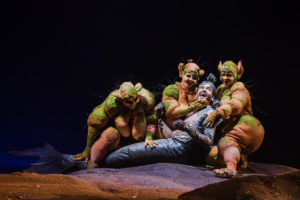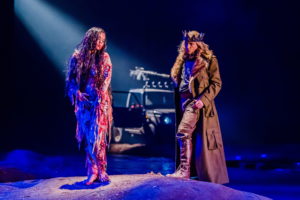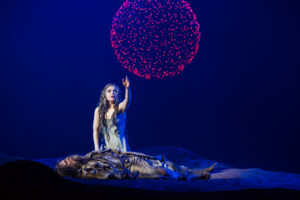Rusalka has returned to Leipzig after 47 years of silence. In scenery like something out of a fairy tale: on the first Sunday of Advent, under the full moon, in a cloud of flakes from the first snowfall. Not even a week later, before the second showing, the city was preparing for another snowstorm. In such windy and cold weather, it was that much easier to realize how very cruel a fairy tale it is. The presence of Rusalka was palpable everywhere. Looking out from the posters hanging in the streets was a half-naked nymph with sad eyes rimmed with dark circles from waiting in vain for her beloved. The Leipzig Opera – unassuming in the daytime and blossoming in its full beauty only at night, like Vodník’s daughter – had distanced itself even more from the Gewandhaus building, soulless as the Prince, standing on the opposite edge of the square. Between the late-born child of Socialist Classicism and the icon of DDR brutalism, a thick forest of Christmas trees and market stalls had grown up, taking the place of the long-since-emptied pond with the fountain. Despite the appearances of carefree holiday cheer, it would be difficult to find a better metaphor for loneliness and alienation.
Since the world premiere of Dvořák’s masterpiece, nearly 117 years have passed. Rusalka has stood the test of time. Today, there are few who dismiss this gloomy tale of devotion and egoism, of vain transgression of boundaries and love that comes too late. A true fairy tale, impossible to play out at any specific time and place, which would destroy the universality of its message. It was aptly interpreted by Antony McDonald, the creator of one of the most beautiful stagings of the last quarter century, recently revived on the stage of the Scottish Opera. In his perspective, the ‘wrong-side-out siren’ came out of the fairytale woods straight into the decadent early 20th-century bourgeois world. Dutchman Michiel Dijkema, a stage director and designer who has for years been active mainly at German theaters, went a similar route, but distributed the accents differently. In the Leipzig Rusalka, it is the Prince who is trying to find his place in a world foreign to him. The action plays out in a forest so dark that you can’t even see the trees; in clouds of fog enshrouding an invisible lake; in a kingdom of primal forces to which not only human beings, but even a water spirit pretending to the name of human will be subject. Dijkema’s Rusalka is no red-haired beauty: she is a grotesque, lizard-like creature with a comb on her back and membranes between her fingers, as similar as two drops of water to her father Vodník (costumes by Jula Reindell). Her companions, the wood nymphs, have taken the form of hideous swamp demons with broad hips and long, sagging breasts. The witch Ježibaba brings to mind associations with the Slavic demon of death and transgression: a being gifted with great wisdom that she is able to use against daredevils impinging upon the natural order of things.

Tuomas Pursio (Vodník in the premiere cast) with Magdalena Hinterdobler, Sandra Maxheimer and Sandra Fechner as Wood Nymphs. Photo: Kirsten Nijhof
The Prince steps into this fairy tale and does not want to leave, even though it is he who is the intruder. In pursuit of the white doe, he unceremoniously drives into the forest in an all-terrain vehicle and shines his headlights in the animal’s eyes. He does not invite guests to his palace, but rather organizes his wedding reception at the edge of the lake. The Gamekeeper and the Kitchen Boy prepare the game in the open air, under cover of night, after which they sneakily pack it into a van labeled ‘Čerstvé kvalita masa’. But after all, Dijkema is not suggesting a simple clash of the contemporary world with that of myth. He is rather unveiling a mechanism of mutual, though disproportionate ‘inculturation’ of the two worlds. Ježibaba would look like she had been taken straight out of Les Ballets Russes’ Le coq d’or in Goncharova’s staging, were it not for one detail: in Act III, Dijkema and Reindell have supplemented her gaudy, lavishly embroidered costume with a down vest. Meanwhile, the Prince comes out onstage in an extravagant antique crown, like a fairytale prince. In the manner of a rich tourist in the Himalayas who parades on the trail in Nepali silk trousers, driving before him a porter in a baseball cap. No one here feels at home. Everything is laced with fear. The dark forest has slipped out of the locals’ control, and treats new arrivals with open enmity.
There are a few extraordinarily powerful theatrical gestures in this show. The moment when Ježibaba unwraps Rusalka from the blood-soaked quilt, takes a knife and mercilessly scrapes the rest of the scales off the half-conscious girl. The moment when the Prince tries to attract this injured creature to himself and begins making stupid faces. There are several superb and well-played ideas, among them the subtly-made suggestion that the Foreign Princess and Ježibaba are one and the same person: the witch’s matted mane is entangled with a chicken foot with a bone sticking out, while the perfidious seductress appears at the wedding in a chicken claw-shaped brocade hat. Dijkema had a bit more difficulty outlining the characters of the individual roles – aside from the titular Rusalka, who was polished in every detail. The Prince too lightly spurns Rusalka – and that, in favour of a Princess completely bland in character. Vodník pities himself more than he despairs over the loss of his daughter. The concept of the finale – despite minor inconsistencies – is nonetheless stunning. The Prince finds Rusalka not after a few days of madness, but after years of wandering: broken like a character from a Shakespeare tragedy. He is truly looking for death and happily finds it. Despite everything, a bitter relief is hidden in the final duet of the old man and the grey-haired Rusalka, though the nymph will pay a higher price for her past hasty decision.
Olena Tokar (Rusalka) and Peter Wedd (Prince). Photo: Kirsten Nijhof
It has been a long time since I have heard and seen onstage such a convincing creator of the title role as the very young Olena Tokar, who by some miracle managed to combine girlish vocal expression with a beautifully round, darkly-coloured voice, intonationally secure, enriched with a warm and soft vibrato. Aside from this, Tokar is a superb actress, conscious both of her own body and of the dramatic potential brought into the narrative by the act of singing in and of itself. I still have in my ears and before my eyes her desperate ‘Ježibabo! Pomoz!’, not to mention the final ‘Za tvou lásku, za tu krásu tvou’, which in her interpretation sounded almost like the love transfiguration of Isolde. Peter Wedd – the only guest in the premiere cast, otherwise comprised exclusively of soloists from Oper Leipzig – certainly supported her in this concept with his own experience as Tristan. I have the impression that this singer is undergoing another metamorphosis – his deep, metallic tenor is maturing more and more; it sounds like the voice of a man who carries an enormous ballast of experiences in his soul, but despite this still does not lose his youthful ardour. In Glasgow, Wedd sang on a somewhat broader breath and with a more open top register: the minor deficiencies of the Leipzig performance, however, I shall chalk up to the process of familiarizing himself with a new, considerably more interesting concept for of the role of the Prince as a tragic character. In the role of Ježibaba, Karin Lovelius did superbly, though in Act I, she had a bit of trouble making fluid transitions between registers. A somewhat weaker performance was turned in by Kathrin Göring, whose role as the Foreign Princess clearly is not a good match for her, even in terms of acting – I was particularly disappointed with her final duet with the Prince from Act II, where sparks should be simply showering the audience from the stage. Words of sincere recognition for their musicality and sense of humor are due to the performers of all of the character roles: Jonathan Mitchie (Gamekeeper), Mirjam Neururer (Kitchen Boy) and the three wonderful Wood Nymphs (Magdalena Hinterdobler, Sandra Maxheimer and Sandra Fechner). Gifted with a gorgeous, well-managed bass-baritone, Vladimir Baykov (whom Varsovians remember as a superb Mephistopheles from Faust under stage director Robert Wilson at the Teatr Wielki – Polish National Opera) created a moving character of Vodník, though he could still do with more paternal authority.
Act III, finale. Olena Tokar and Peter Wedd. Photo: Kirsten Nijhof
The soloists performed their tasks considerably better than expected – despite the very difficult acoustics of the Opera in Leipzig and negligible support from conductor Christoph Gedschold. The Gewandhaus-Orchester played, as always, competently and with a beautiful, clear sound, but decidedly too loudly, disregarding most of the dynamic and agogical nuances in this extraordinary score; but more importantly, without looking at the singers. The most tender piano passages and masterfully-shaped phrases were sometimes drowned in a flood of tutti; the conductor either didn’t give the soloists time to bring the sound out properly, or quite the contrary – left them on the battlefield with an occasional harsh note. Dvořák’s masterpiece, instead of breathing and pulsating with the rhythm of an enchanted forest, went evenly from measure to measure, moving inexorably toward a far-from-subtle finale. It is a pity that a true specialist in the Czech composer’s music didn’t occupy the podium – a pity all the greater that, having at his disposal such a cast and such an experienced orchestral ensemble, he could have crushed hearts of stone. And even turned the accursed Rusalka back from her way to the depths of the lake.
Translated by: Karol Thornton-Remiszewski


